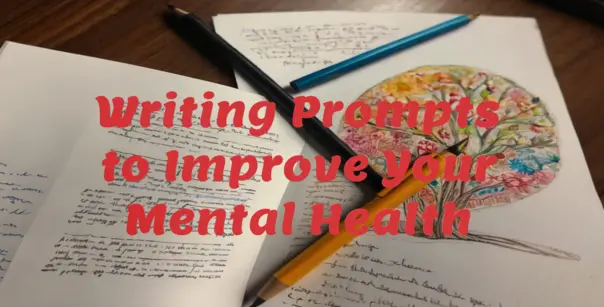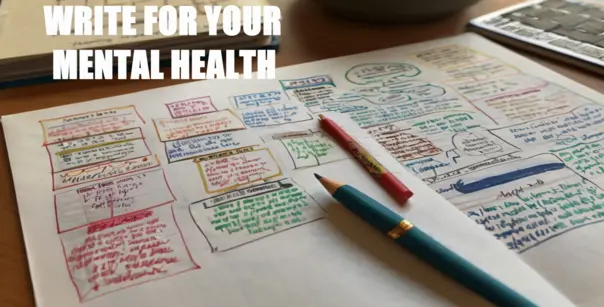
20 Writing Prompts To Improve Your Mental Health
The little things you do each day, like going for a walk in the park or working out at the gym, can help you deal with stress, despair, and anxiety. Though it may seem overwhelming at first, journaling is simpler than you may imagine. keep reading for 20 Writing Prompts To Improve Your Mental Health.
Do You Consider Writing to be Your Thing? If yes, Then Here is a starting point.
To begin with, you don’t need to be a good writer for the journal. Additionally, it doesn’t take a lot of time.
Whether you’re writing your thoughts down with a beautiful pen in an attractive book or tapping them out on an app, a few minutes a day can have a significant impact.
Despite its advantages, journaling shouldn’t take the place of professional mental health care. Chivonna Childs, PhD, a counselling psychologist with Cleveland Clinic in Ohio, asserts that it “does not replace therapy.” If the issues are serious enough, it should be utilised in addition to treatment.

How Can keeping a Journal Be Beneficial to Your Mental Health?
Writing a journal can be a beneficial method to express our innermost feelings, let our emotions out, or simply empty our minds, according to Childs.
Consider keeping a journal as a way to express your thoughts, troubles, and anxieties. It can assist you in gaining understanding in murky circumstances and in coming to terms with upsetting issues.
It’s a proven fact that writing about intense emotions can make them less intense. Additionally, writing in a notebook about good aspects of your life will help you switch from a pessimistic to a more upbeat frame of mind.
What does research on journaling and mental health say? According to a short study by Penn State University researchers, journaling is linked to improved well-being and decreased mental distress, anxiety, and depressive symptoms.
READ ALSO:
- The Importance Of Mental Health For Students
- Your Heart And Its Role In Your Mental Health
- Insomnia And How It Affects Your Mental Health
Other studies indicate that keeping a gratitude diary can help you feel better emotionally and that journaling may help you feel less post-traumatic stress disorder symptoms.
Just be mindful of how much you’re lingering or fixating in your notebook on unfavourable ideas or recollections, as this can be detrimental to your health.
The drawback of journaling, according to Childs, is when we focus on problems rather than solutions.
Steps for Beginning a Mental Health Journal
The method you keep a journal is up to you. Others choose to write in their journals at night as part of their bedtime ritual, while some people prefer to journal first thing in the morning to prepare for their day.
Pick a time that’s most convenient for you: When do you have five to ten free minutes to write in your journal? When do you feel the most anxious?
Your daily to-do list seems to be too much. Do you have a hard time falling asleep because you can’t shut your mind off?
It shouldn’t feel like a burden or work, according to Childs. “If you want to begin, five minutes a day is a wonderful place to start. It’s acceptable to keep writing until you’re exhausted. Do what feels right to you.
Additionally, there is no universally accepted superior journal type. The greatest diary is the one you use, whether it’s a guided journal for anxiety or wellbeing that has prompts already included, a blank journal that gives you a blank canvas to write on, or an app or website.
Keeping a gratitude diary can help you focus on the good aspects of your life and is another simple style of journaling to attempt. Write down a few things you’re thankful for at the start and end of each day, from the delicious cup of coffee you savoured in the morning to the sloppy kisses your dog gave you after work.

20 Writing Prompts to Improve Your Mental Health
Not sure where to begin when you want to write? Pick one of these writing prompts to improve your mental health, and then write whatever comes to mind.
1. Give thanks for five things today.
2. What qualities, such as kindness and empathy, best describe you in relationships or friendships?
3. What boundaries in your relationships could you establish to protect your own well-being?
4. Which five qualities do you look for most in a partner?
5. What do you value most in relationships with friends, family, and romantic partners?
6. Send yourself a letter of love.
READ ALSO:
- Factors That Can Affect Your Mental Health
- Poor Communication Can Affect Mental Health
- You, Your Health, And Your Mental Clarity
7. What three aspects of your current relationship are successful?
8. What three things in your current relationship should be improved?
9. How do you show others compassion? How can you show yourself the same compassion?
10. When are you the happiest?
11. What about your personality do you like best?
12. Which of today’s moments brought you joy or beauty?
13. Describe the setting that makes you feel the most at ease and peaceful.
14. Send yourself a letter of forgiveness.
15. What or who most inspires you?
16. What are your top priorities for your current or future children?
17. Share a selfless deed or act of kindness you performed for someone. How did doing this feel?
18. What was your young child’s favourite book or story? Why did you find it so appealing?
19. What time of the day is your favourite?
20. Which activities in your everyday life give you the most tension or annoyance? How are you handling them?
I hope you enjoyed these prompts to improve your mental health. Don’t forget to share, someone you know might need it.
